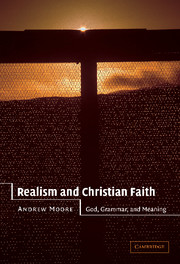Book contents
- Frontmatter
- Contents
- Preface
- 1 Realism and Christian faith: towards an ontological approach
- 2 ‘Limping with two different opinions’?
- 3 Taking leave of theological realism
- 4 Realism and Christian faith after Wittgenstein
- 5 The grammar of Christian faith and the relationship between philosophy and theology
- 6 Representation, reconciliation, and the problem of meaning
- 7 God, reality, and realism
- 8 Speaking the reality of God
- 9 Realism: conformed to the conforming word
- References
- Index of scripture references
- Index of names and subjects
3 - Taking leave of theological realism
Published online by Cambridge University Press: 02 December 2009
- Frontmatter
- Contents
- Preface
- 1 Realism and Christian faith: towards an ontological approach
- 2 ‘Limping with two different opinions’?
- 3 Taking leave of theological realism
- 4 Realism and Christian faith after Wittgenstein
- 5 The grammar of Christian faith and the relationship between philosophy and theology
- 6 Representation, reconciliation, and the problem of meaning
- 7 God, reality, and realism
- 8 Speaking the reality of God
- 9 Realism: conformed to the conforming word
- References
- Index of scripture references
- Index of names and subjects
Summary
I have argued that theological realism is imprecise about the identity of the God whose mind-independent reality its exponents wish to defend and that it underestimates the problems arising from inadequately distinguishing the God of the philosophers from the triune God of Christian faith. In this chapter we explore the ways in which these difficulties ramify into the heart of theological realism. I shall argue that in their use of analogies with the defence of realism in the philosophy of science, theological realists make a ‘category mistake’. To adapt Gilbert Ryle's definition, they represent the ‘grammar’ of God's existence as if it ‘belonged to one logical type or category’ – in this case, that of science – ‘when actually [it] belong[s] to another’ (Ryle 1963: 17). Theological realists' methodological outlook is controlled more by the philosophy of science than God's self-revelation in Christ. This category mistake has important epistemological and ontological ramifications and suggests that Christians should take leave of theological realism for a more Christologically nuanced understanding of realism orientated by the triune God.
After an introduction to the debate between realist and empiricist perspectives in science and theology, we examine a number of methodological analogies between science and theology presupposed by theological realists. However, it will emerge that from both philosophical and theological perspectives there are significant disanalogies between the two disciplines.
- Type
- Chapter
- Information
- Realism and Christian FaithGod, Grammar, and Meaning, pp. 40 - 72Publisher: Cambridge University PressPrint publication year: 2003

